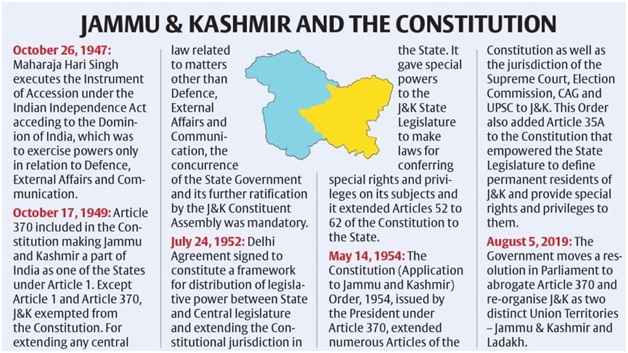Supreme Court Upholds Abrogation of Article 370 (Indian Express)

- 12 Dec 2023
Why is it in the News?
The Supreme Court in a 5-0 unanimous ruling upheld the Centre’s abrogation of Article 370 of the Constitution on December 11.
News Summary:
- A five-member Constitution bench of the Supreme Court, headed by Chief Justice D.Y. Chandrachud, unanimously upheld on December 11 the abrogation of Articles 370 and 35A and the carving out of Ladakh as constitutionally valid.
- The SC noted that Article 370 was a temporary provision and that the erstwhile State of Jammu and Kashmir had no internal sovereignty.
- The top court has directed the Election Commission to ensure elections are held to the J&K assembly by September 30, 2024.
- The court has also recommended the government form a truth and reconciliation commission to record the human rights abuses in Jammu and Kashmir by both state and non-state actors.
Key Highlights from the Judgment:
- Regarding the 'unique' and 'special status' of Jammu and Kashmir: The Supreme Court clarified that J&K lost its sovereignty after acceding to India in 1947.
- Despite an initial proclamation by Maharaja Hari Singh expressing intent to retain sovereignty, his successor, Karan Singh, declared that the Indian Constitution would prevail.
- This proclamation, issued on November 25, 1949, repealed the Government of India Act, 1935, and made the Constitution of India applicable to J&K, essentially merging it with India.
- On Jammu and Kashmir being an integral part of India: Chief Justice Chandrachud cited Section 3 of the J&K Constitution, along with Articles 1 and 370 of the Indian Constitution.
- Article 3 of the J&K Constitution explicitly states that the state is an integral part of the Union of India.
- The court emphasized that having its own Constitution did not confer special status; it aimed at everyday governance, while Article 370 intended integration with India.
- On the restoration of statehood: The court deemed the reorganization into Union Territories in 2019 as temporary and directed the Centre to restore statehood and conduct Legislative Assembly elections.
- Article 370 - temporary or permanent: The Supreme Court affirmed that Article 370 is a temporary, transitional provision, originally meant for the specific circumstances during the state's accession to India in 1947.
- Concerning the effective abrogation of Article 370: The Court upheld both presidential proclamations of August 2019, including the redefinition of the 'constituent assembly of Jammu and Kashmir' as the 'Legislative Assembly of Jammu and Kashmir.'
- It referred to the 'SR Bommai v Union of India' ruling, asserting that actions taken during the President's rule were not prima facie malafide.
- Truth and Reconciliation Commission: Justice Sanjay Kaul proposed establishing a Truth and Reconciliation Commission to investigate alleged human rights violations by both state and non-state actors in J&K.
- Such a commission would officially acknowledge and disclose past wrongdoings to address and resolve historical conflicts.
What is Article 370 of the Constitution of India?
- On October 17, 1949, Article 370 became part of the Indian constitution as a 'temporary provision.'
- This article granted special privileges to Jammu & Kashmir, allowing it to create its own constitution and limiting the legislative powers of the Indian Parliament in the state.
- Origin: N Gopalaswami Ayyangar introduced Article 370 as Article 306 A in the draft constitution.
- Provisions: Under Article 370, the Constituent Assembly of Jammu & Kashmir had the authority to recommend which articles of the Indian Constitution should be applicable to the state.
- After drafting the state's constitution, the J&K Constituent Assembly was dissolved.
- Clause 3 of Article 370 gives the President of India the power to amend its provisions and scope.
- Article 35A: Stemming from Article 370, Article 35A was introduced in 1954 through a Presidential Order based on the J&K Constituent Assembly's recommendation.
- It empowers the Jammu & Kashmir legislature to define the state's permanent residents and their special rights and privileges.
Abrogation of Article 370:
- On August 5, 2019, the Government of India, repealed nearly all provisions of Article 370 in the Indian constitution.
- The President issued The Constitution (Application to Jammu And Kashmir) Order, 2019 on the same day.
- This order substituted the term ‘Constituent Assembly’ in Article 370(3) with ‘Legislative Assembly [of Jammu & Kashmir].’
- It's important to note that the Order technically modified the interpretation clause of Article 367, not Article 370 itself; it utilized Article 370(1) for this purpose.
- Subsequently, a Statutory Resolution was presented in the Rajya Sabha, leading to the abrogation of the majority of Article 370.
- This action was possible without the concurrence of the Jammu & Kashmir Legislative Assembly as the State was under the President’s rule.
- On August 6, Parliament approved the Jammu and Kashmir Reorganisation Bill, 2019, dividing the State into two Union Territories: Jammu & Kashmir and Ladakh, with the former being provided with a legislative assembly.
The Supreme Court’s ruling is in line with what the Centre had argued during the hearing. The Union government had said the 1949 proclamation accepted the supremacy of the Indian Constitution and surrendered sovereignty to it, where the sovereign was ‘We the people of India’.
